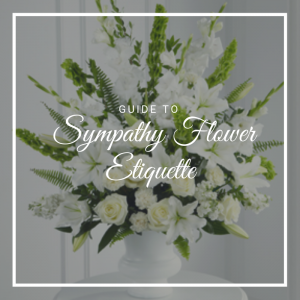 Flowers are a traditional way to express your condolences. However, did you know that there are etiquette rules to keep in mind when choosing sympathy flowers?
Flowers are a traditional way to express your condolences. However, did you know that there are etiquette rules to keep in mind when choosing sympathy flowers?
Here’s our handy guide to sympathy flower etiquette:
Is it too late to send sympathy flowers after the funeral has passed?
Absolutely not! In fact, it’s a nice gesture to send flowers a week or so after the funeral has passed to remind the family that they are still in your thoughts.
What kind of flowers should I send?
Certain types of flowers, like lilies, chrysanthemums, carnations, roses and gladioli, are traditional for condolences. However, you don’t have to limit yourself to those. If the deceased loved a particular type of flower, that would also make a thoughtful choice.
What should I write in the enclosure card?
Stick to simple expressions of sympathy. A short sentence (“Our thoughts and prayers are with you”) is most appropriate.
- Pro tip: If you knew the deceased, but not the surviving family members to whom you’re sending the card and flowers to, mention your connection to their loved one and share a brief story or memory.
Is there ever a time when sympathy flowers are not appropriate?
If the deceased was Jewish, his or her family may be holding a “shiva” in their home for seven days, during which time friends and family come by to pay their respects. Flowers are not considered appropriate for shiva calls, but fruit and food baskets are much appreciated.
If you’re in need of a sympathy bouquet to give to a friend, family member or colleague, browse the selection of sympathy flowers at Dallas House of Flowers. You can also call us toll-free at 1-800-873-0917 to find out how we can help you express your condolences.